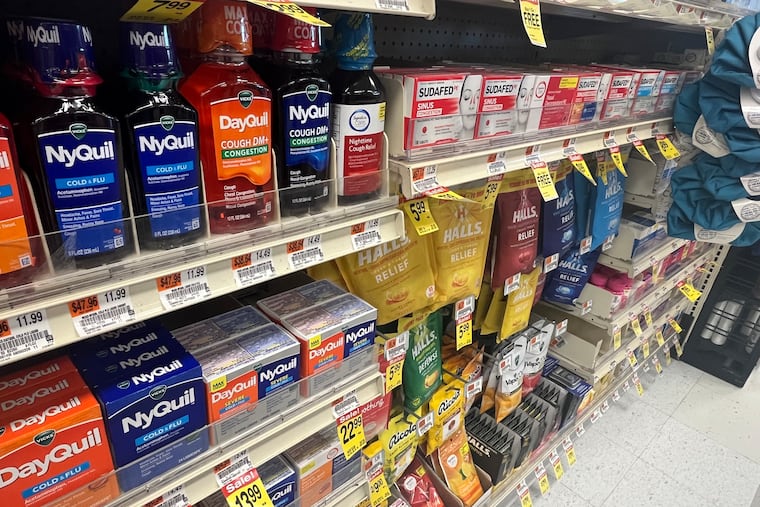Many popular cold meds don’t work, the FDA says. We spoke to doctors and pharmacists to learn what does
Phenylephrine’s inadequacy at treating colds has been suspected for years.

In the cough and cold aisle at a South Philadelphia CVS this week, Samantha Romano searched the shelves for some relief for her boyfriend, who had a bad cold and a sore throat.
The couple had a half-used box of DayQuil at home, but Romano remembered hearing something about a recent government warning that it might not work. She opted for a throat spray to help ease his symptoms instead.
Like Romano, many consumers this winter are looking for cold remedies beyond some of the industry’s most popular medications. This fall, a federal advisory committee found that phenylephrine, a widespread anti-congestion ingredient in treatments like DayQuil and Advil Sinus Congestion and Pain, isn’t effective when taken orally.
Now, doctors and pharmacists are working to help patients seek out options other than the best-selling brand name drugs they may have relied on in previous flu seasons.
Sniffling, runny nose misery? This drug won’t actually help
Phenylephrine is intended to combat congestion and nasal pain from colds and allergies by reducing swelling in your nose’s blood vessels.
It can be dangerous if taken by children under 4, and side effects include nervousness, dizziness, and sleeplessness. But the Food and Drug Administration, which convened the advisory committee on phenylephrine this fall, says the drug’s safety isn’t a concern.
Phenylephrine’s ineffectiveness when taken orally has been suspected for years, said Ian Paul, a professor of pediatrics at Penn State Health who has also consulted with pharmaceutical companies on cold and cough remedies. In 2007, he wrote an article for the American Academy of Pediatrics warning about the lack of evidence to support phenylephrine’s use to treat colds.
Research suggested another drug, pseudoephedrine — sold under the brand name Sudafed — could combat congestion effectively, Paul wrote. But since 2005, the federal government has required that it be dispensed from behind a pharmacy counter, because it could be used to produce illicit methamphetamine.
As an alternative, phenylephrine products were stocked on pharmacy shelves to be more easily accessible. Sudafed’s manufacturers began selling a version with phenylephrine, called Sudafed PE.
Some pharmacists, like Mayank Amin, were wary about stocking phenylephrine drugs. At his independent Skippack Pharmacy in Montgomery County, Amin was worried that people would confuse it with pseudoephedrine, which they had to speak to pharmacists to get.
Amin wasn’t surprised when an FDA advisory committee found in September that phenylephrine was ineffective when taken as commonly sold pills. Phenylephrine can still be effective in the form of a nasal spray, physicians say, because it is interacting directly with nasal tissue, as opposed to metabolizing in the liver.
He hoped the ruling would prompt more patients to carefully read the labels on the drugs they buy off the shelf, or consult their pharmacists.
“Pharmacists are the most accessible health care professional, and people still come to us for additional care — they say, ‘Hey, Dr. Mak, what do you recommend I take today?’” he said. “When a drug is sold behind the counter, we can make a better recommendation — we can ask if they have high blood pressure, or another condition that could interact with a drug.”
Stores pull some products after new guidance
After the committee’s findings, some consumers and advocates say they’d rather avoid phenylephrine. CVS has already pulled products that contain only phenylephrine from its shelves, but products like DayQuil, which include other active ingredients to treat colds, are still available.
Su Robotti, a consumer representative on another FDA drug safety committee, said that she hoped the FDA would eventually pull phenylephrine medications from shelves entirely.
“People aren’t getting the care that they need, and it’s wasting people’s time and money,” said Robotti, the founder of MedShadow, a nonprofit that publishes articles on medication side effects.
The FDA has said it will consider its advisory committee’s ruling before taking a final action on the medication.
How to treat a common cold
Romano, the South Philadelphia woman looking to treat her boyfriend’s cold, avoids most cold medicines because she has a health condition that can be exacerbated by the side effects. She and her boyfriend were considering treating his symptoms with home remedies as well.
Some home remedies — like using honey to soothe a sore throat — are more effective than some cold medicines, according to Paul’s own research and review of the scientific evidence. A patient might also get relief from symptoms by rinsing their nose with saline, staying hydrated, and using a topical vapor rub, he said.
“Chicken soup, steam baths, good hydration — there’s not a lot of hard evidence from well-conducted clinical trials to show they work, but Grandmom’s chicken soup is not going to hurt you,” he said. “It’s really just about patience and time for the regular garden-variety colds.”
For decongestion, patients can seek out the more effective pseudoephedrine by speaking to their pharmacists, or opt for a phenylephrine nasal spray.
Ibuprofen and acetaminophen can help lower a fever. And products like DayQuil and Advil Sinus Congestion and Pain also contain acetaminophen and ibuprofen, so they might still offer some relief for people struggling with a cold — it’s just not because of the phenylephrine.
“DayQuil is like throwing a concoction at someone. If someone’s feeling terrible, with a cough, a cold, or a fever, DayQuil or NyQuil will help because they have multiple [active ingredients],” Amin said.